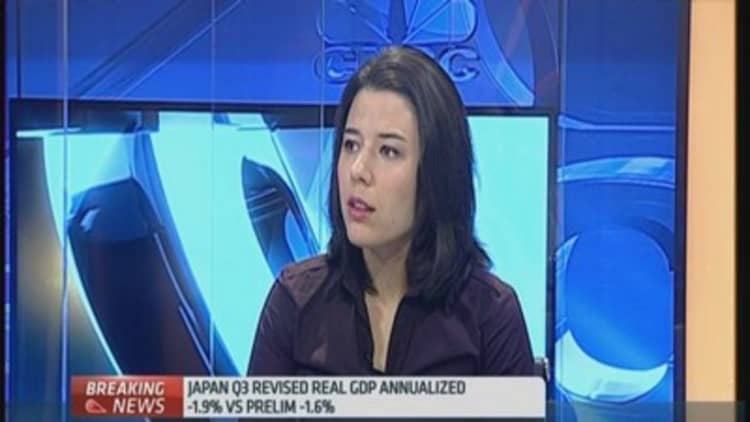Japan's economy shrank more than initially thought in the third quarter, revised figures showed on Monday, exacerbating concerns about Prime Minister Shinzo Abe's effort to spur growth.
The economy shrank an annualized 1.9 percent in the July-September quarter, revised figures showed, worse than expectations for a 0.5 percent contraction in a Reuters poll and down from an initial 1.6 percent contraction recorded in November.
Read MoreNew repair manual needed for Japan's broken economy
On a quarter-on-quarter basis, the economy contracted 0.5 percent, compared with an initial 0.4 percent contraction.
"The large drag from inventories last quarter overstated the weakness of the economy somewhat. In the meantime, the monthly data have been more encouraging," Marcel Thieliant, Japan economist at Capital Economics wrote in a note. "The upshot is that the economy likely returned to growth this quarter."
Meanwhile, quarter-on-quarter capex for the July-September period was revised to a 0.4 percent contraction from a preliminary contraction of 0.2 percent, below expectations for a 0.8 percent expansion in a Reuters poll. Private consumption remained unchanged at 0.4 percent.
"We were expecting capex to be revised up, it's very disappointing," Izumi Devalier, Japan economist at HSBC told CNBC.
Read MoreMoody's downgrades Japan as concerns grow
"I'm more concerned about private consumption. If you look at all the high frequency data, it does look like capex is on a solid footing, led by a recovery in exports. What I'm more concerned about long-term is whether private consumption sufficiently picks up to support growth next year," she said.

"I don't think we'll see private consumption recover until at least the new fiscal year," Devalier added. "Abe's hoping that we'll get another round of wage hikes, but I think companies are still very cautious."
Japan tipped into a recession during the third quarter as the economy continued to struggle with the impact of a consumption tax hike to 8 percent from 5 percent in April.
The November reading led Prime Minister Shinzo Abe to delay a second tax hike, initially scheduled for October 2015, by 18 months and to call snap elections for mid-December as he seeks a fresh mandate for Abenomics - a series of monetary and fiscal stimulus and long-term structural reforms unveiled last year to kickstart the Japanese economy.
Read MoreJapan elections a wild card for Nikkei
Current account
Current account data released at the same time showed Japan posted an unadjusted surplus of 833.4 billion yen for October - its fourth straight surplus. The reading was above expectations for a 366.3 billion surplus in a Reuters poll.
"[The strong reading] was caused by a jump in the service balance, which recorded a surplus for the first time in the history of the series, as well as a spike in the primary income balance, which surged to a record high, too," Capital Economics' Thieliant wrote.
"The sudden surge in the service balance, which saw by far the largest monthly change on record, looks odd," he said. "We would expect the surplus to drop again in November."
The data had little impact on Japanese markets; the Nikkei rose 0.6 percent in early trading shortly after the data was released.

